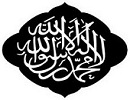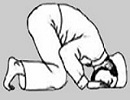-
Assalaamu Alaikum (peace be upon you)
We the Janathi Message team would like to take this opportunity to congratulate and welcome you to the world of Islam. May Allah (S.W.T) bless you and grant you all the success in this life and hear after.
Our website is constantly trying to facilitate all possible avenues in delivering the true message of Islam; varying from the basics of Islam to intellectual level. We felt the need to compile an easy guide for New Muslims and those who are thinking of accepting Islam and becoming a Muslim, to further research and broaden knowledge so they can follow and practice the True Religion of peace.
Islam is frequently misunderstood; perhaps this is because religion no longer dominates everyday life in Western society; whereas, for Muslims, Islam is a way of life. Muslims make no artificial division between the secular and the sacred.
For quite some time Islam was thought of as some "Eastern" religion, but with the increasing number of Muslims living in the West, Islam is gradually being perceived as a global faith.
This simple guide covers few main areas:
• How to become a New Muslim
• Basic Islamic teachings
• What is Sunnah
• How to live as a Muslim - Definition
The word Islam has a two-fold meaning: peace, and submission to Allah (S.W.T) (God). This submission requires a fully conscious and willing effort to submit to the one, Allah (S.W.T). One must consciously and conscientiously give oneself to the service of Allah (S.W.T). This means to act on what Allah (S.W.T) enjoins all of us to do (in the Quran) and what His beloved Prophet, Muhammad (S.A.W) encouraged us to do in his Sunnah (his lifestyle and sayings).
Once we humble ourselves, rid ourselves of our egoism and submit totally to Allah (S.W.T), and to Him (S.W.T) exclusively, in faith and in action, we will surely feel peace in our hearts. Establishing peace in our hearts will bring about peace in our external conduct as well. Islam is a complete way of life.
Muslims must practice the Five Pillars of the Religion:
The Declaration of Faith in the Oneness of Allah (S.W.T) and the Prophethood of Muhammad (S.A.W), Salah (Muslim Prayer), Sawm (Fasting the month of Ramadan), Zakat (Alms-tax), and the Pilgrimage to Makkah.
And also to believe in the seven articles of Faith: Belief in Allah (S.W.T), the Angels, the Holy Books, the Prophets, the Day of Judgment, Allah’s (S.W.T) Decree and the believe in Life after Death. - How to become a Muslim
If anyone has a real desire to be a Muslim and has full conviction and strong belief that Islam is the true religion then all one needs to do is pronounce the “Shahadah”, the testimony of faith, without further delay.
Becoming a Muslim is a simple process. Testify before two witnesses that:
1) There is no one worthy of worship, except Allah (S.W.T) and that
2) Muhammad (S.A.W) is the Messenger of Allah (S.W.T).
The “Shahadah” is the First and most important of the Five Pillars of Islam. With the pronunciation of this testimony, or “Shahadah”, with sincere belief and conviction, one enters into the fold of Islam.
Our Holy Prophet Muhammad (S.A.W) has said; “Do you not know that accepting Islam destroys all Sins which come before it?” (Muslim Shareef)
By reciting the Shahadah one has become spiritually cleansed. You then further have to clean the body by taking an Islamic bath (Ghusl) and wear clean clothes.
Please go to Cleanliness section.
The 5 pillars of Islam are: (click the images for more info) -
Basic Islamic Teachings
There are Seven main beliefs in Islam. These are known as the Imaan Mufasil.It reads as follows, "Amantubillahi wa mala-ikatihi wa kutubihi wa rasulihi wal yowm ul akhiri wal qadri, khayrihi wa sharihi min Allahi ta'ala wal ba'ith ba'ed al mowt."
Translation:
"I believe in Allah, His Angels, His Books, His Messengers, the Last Day, Measurement, both the good and the bad are from Allah the Exalted, and in life after death."
In summary, Muslims believe in Allah (S.W.T), in His Angels, Holy Scriptures (Quran, true bible and Torah etc.), the Prophets (A.S), believe in the life after death, including interrogation in the grave, punishment in the grave, the Day of Judgement, rendering account of ones deeds, and passing over the Siraat Bridge, believe in the existence of Paradise, and the believers will live in it forever, believe in the existence of Hell, with its severest punishments, and that it will last forever. All the Seven articles stated in Imaan Mufasil are quite evident from the sacred text of the Holy Quran, as well as, from the Holy words of Holy Prophet Muhammad (S.A.W).
FOR MORE IN DEPTH AND CONCISE DETAILS ON BELIEFS,
SEE OUR LITERATURE SECTION -
Basic Understandings
Allah: This is the name for "God" in Arabic. Allah (S.W.T) is not a human, not a male and not a female. We only say the term "He" when referring to Him because there is no "It" in Arabic. Allah (S.W.T) created everything and was never created. He is never born, He never has children and the human mind cannot encompass His Magnitude and Greatness. He is Loving but Just, Merciful but Stern. Only by surrendering to His will can we come into accordance with His universal will.
Angels: They are not human, nor male or female. They are the servants of Allah (S.W.T) and never rebel against Him. Angels record our good and bad deeds and are behind the events of nature and enforce Allah's (S.W.T) will in the universe, although He doesn't need their help.
Books: Allah (S.W.T) has sent revelations through His chosen and blessed Prophets (A.S) throughout history, so that they can teach and educate their Nations. Some revelations were in small scrolls and some as major books.
These are known as scrolls of Ibrahim (A.S) (Abraham), the Taurah of Musa (A.S) (Moses), the Zabur (Psalms) of Dawud (A.S) (David), the Injeel (Bible) of Esa (A.S) (Jesus) and the Quran of Muhammad (S.A.W). Only the last book has survived until the present day and will remain unchanged till end of the days. All others have been lost or altered so much so that they are not the true word of Allah (S.W.T). - Messengers: These are Allah's (S.W.T) Prophets and Messengers (A.S) to whom Allah (S.W.T) gave Revelation. Every nation and race on earth received at least one Messenger in the past. They all taught the same message: to surrender to Allah (S.W.T) and do right. Thus we say they all taught Islam. The First Prophet is Adam (A.S) and the Last and Final Messenger is Muhammad (S.A.W).
The Last Day: Human existence will end one day. Allah (S.W.T) will end the universe; with this all forms of life will come to an end. All human beings that ever lived will then be raised up for Judgment Day. After each person's good and bad deeds as well as their beliefs are examined, they will be sent to either Paradise (Jannah) or Hell (Jahannam).
Measurement: What has been decreed from Allah (S.W.T) for the creation is destiny and not what we have control over or be accounted for.
Life after Death: Eternal life in either Heaven or Hell for our souls based on what we believed and did while we lived in the world. Some people will be taken out of Hell and admitted to Heaven when the term of their punishment is over.
- Reciting the Holy Quran
The Quran is a compilation of the Word of Allah (S.W.T), sent down through Angel Gabrial (Hazrat Jibrail (A.S)) to the Holy Prophet Muhammad (S.A.W). The First revelation was revealed to the Prophet (S.A.W) at Mount Hira at the age of Forty. The whole Quran was completed in a period of approximately 23 years.Holy Quran is composed of 6666 verses (Ayahs) that make up 114 chapters (Surah) of unequal length which are classified either as Meccan or Medinan depending upon their place and time of revelation.
Shortly after Prophet Muhammad’s (S.A.W) demise, the Holy Quran was compiled into a single book by order of the first Caliph Hazrat Abu Bakr (R.A) and at the suggestion of his future successor Hazrat Umar (R.A).
Few sayings of Holy Prophet (S.A.W):1) The best of you is he who learnt the Holy Quran and taught it to others.
(Bukhari Shareef)2) Undoubtedly, the heart gets rusted like metal gets rusted when water goes over it. The People asked, "How can they [hearts] be cleaned." The Prophet replied, "To remember death in abundance and to recite the Holy Quran."
(Mishkat Shareef)
- What is Sunnah?
In Islam, the Arabic word Sunnah refers to the way our Holy Prophet Muhammad (S.A.W) lived His life. The Sunnah is the Second source of Islamic law, the First being the Quran. Both sources are necessary in order to practice Islam.The Arabic word Hadith is very similar to Sunnah, but not identical.
A Hadith is a narration about the life of Holy Prophet (S.A.W) - as opposed to his life itself (Sunnah).Sunnah is the perfect example for Muslims to follow. By living our lives in accordance to Sunnah, not only do we benefit physically, but are also greatly rewarded with Allah (S.W.T's) blessings.
The Sunnah of the Holy Prophet (S.A.W) provides us with guidance about every aspect of our life. From our daily living, to worship, to matters such as trade, marriage and so on. The Sunnah guides us to the best way of life, as the Prophet Muhammad (S.A.W) is the perfect role model.
According to AHadith:
If one revives even one Sunnah while the Muslim society is in confusion facings corruption, then he/she will get the "Sawaab” (Reward) of 100 Shaheed (Martyrs). (Tabrani Shareef)
- How To Live as a Muslim
You should try your best to live according to Islam. You cannot learn everything at once. So try to do things in order.
First is the Prayer (Salah). Learn how to Prayer the five daily Prayers.
Learn how to dress as a Muslim and what to eat and what not to eat. If things seem hard at first do not worry. Things will seem easy eventually.
A Muslim should eat with their Right Hand, and not eat Haram (Forbidden) food.
A Muslim should use only the Left Hand for cleaning themselves after going to the toilet. Clean with toilet paper and then wash front and backside with water.
A Muslim shouldn't allow urine, faeces or dog saliva to be on their body or clothes.
It is Forbidden for Muslim to flirt or date or have sexual relationships with the opposite sex other than their husband/ wife (providing they are Muslims).
A Muslim should not shake hands or hug a person of the opposite sex other than their Mahrems. Mehrems are those people whom it is Forbidden for you to marry.
For a man it will be his mother, grandmother, sisters, daughters, mother and father's sisters (aunties) and nieces.
- Help at Hand
Please browse our website for more information on how to learn and practice Islam.Our website covers all aspect of Religion, ranging from basic level (under Kids Section) to in-depth and concise level (under Literature Section).
We also provide an “Ask the Imam” facility, where you can submit your questions to the Scholars, anonymously and in full confidence. Also you can browse hundreds of categorised questions with answers.
If you want to contribute and give suggestions on what you would like to see in the New Muslims Section, which will benefit other New Muslims, please go to our Contact Us page.




